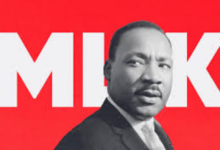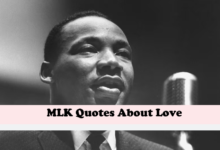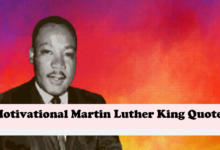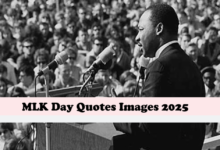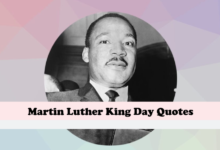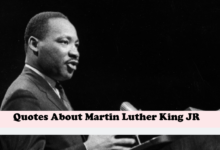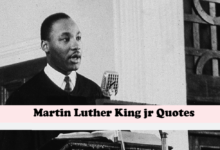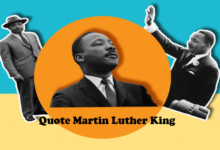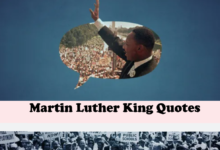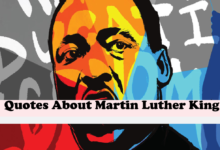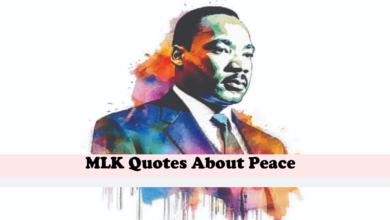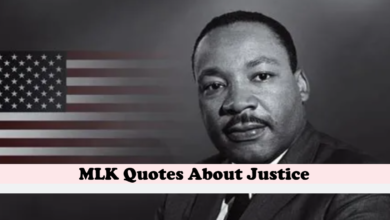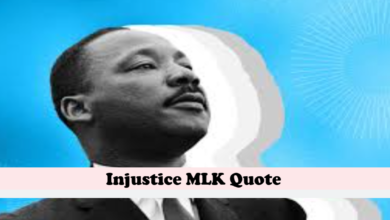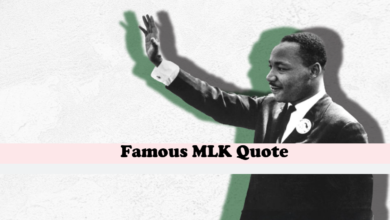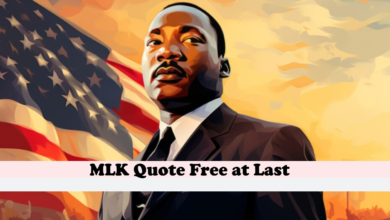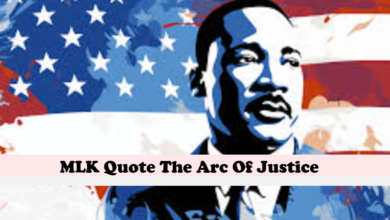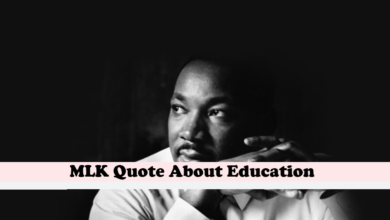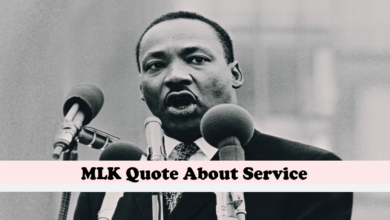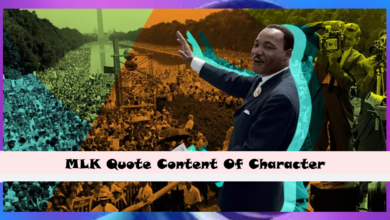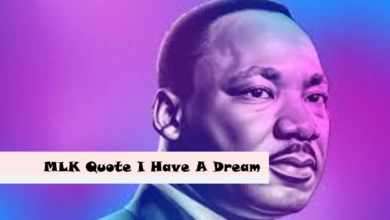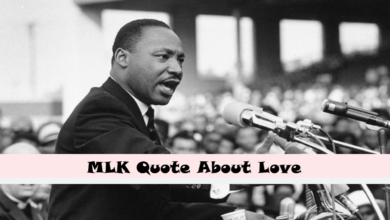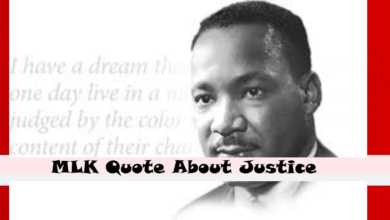MLK Quotes About Love
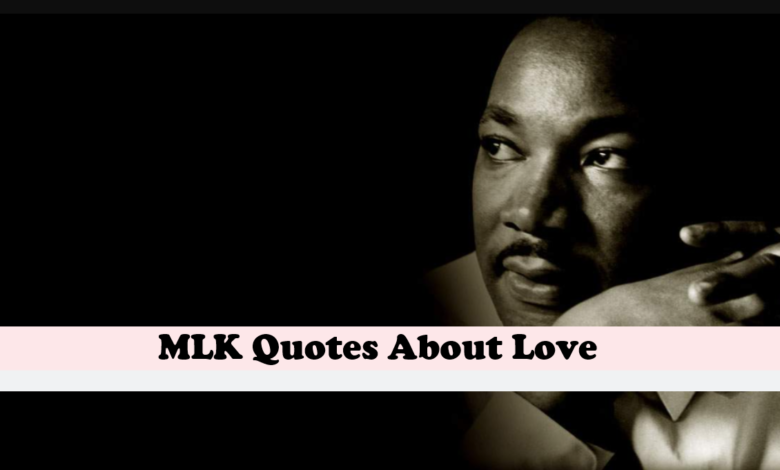
Martin Luther King Jr. is often remembered for his leadership in the Civil Rights Movement, his advocacy for racial equality, and his unflinching commitment to justice. But at the heart of his activism was a deep, abiding belief in the transformative power of love. King saw love not just as a personal emotion, but as a powerful force for social change. His philosophy of love was rooted in the teachings of Jesus Christ and the principles of nonviolence that he embraced from Mahatma Gandhi. For King, love was the foundation of his activism, the tool through which he sought to dismantle hate and injustice, and the pathway to achieving a more just and equitable society.
In this blog post, we’ll explore some of Martin Luther King Jr.’s most memorable quotes about love, reflecting on how his message of love continues to inspire movements for social justice today.
MLK Quotes About Love
“Darkness cannot drive out darkness: only light can do that. Hate cannot drive out hate: only love can do that.”
― Martin Luther King Jr.,
“I have decided to stick to love…Hate is too great a burden to bear.”
― Martin Luther King Jr.
“I have decided to stick to love…Hate is too great a burden to bear.”
― Martin Luther King Jr.
“Our lives begin to end the day we become silent about things that matter.”
― Martin Luther King Jr.
“In the end, we will remember not the words of our enemies, but the silence of our friends.”
― Martin Luther King Jr.
Faith is taking the first step even when you can’t see the whole staircase.”
― Martin Luther King Jr.
“If you can’t fly then run, if you can’t run then walk, if you can’t walk then crawl, but whatever you do you have to keep moving forward.”
― Martin Luther King Jr.
“But I know, somehow, that only when it is dark enough can you see the stars.”
― Martin Luther King, Jr.
“Let no man pull you so low as to hate him.”
― Martin Luther King Jr., A Knock at Midnight: Inspiration from the Great Sermons of Reverend Martin Luther King, Jr.
“There comes a time when one must take a position that is neither safe, nor politic, nor popular, but he must take it because conscience tells him it is right.”
― Martin Luther King Jr., A Testament of Hope: The Essential Writings and Speeches
“Nothing in the world is more dangerous than sincere ignorance and conscientious stupidity.”
― Martin Luther King Jr.
“The ultimate measure of a man is not where he stands in moments of comfort and convenience, but where he stands at times of challenge and controversy.”
― Martin Luther King Jr.
“Intelligence plus character-that is the goal of true education.”
― Martin Luther King Jr.
“Everybody can be great…because anybody can serve. You don’t have to have a college degree to serve. You don’t have to make your subject and verb agree to serve. You only need a heart full of grace. A soul generated by love.”
― Martin Luther King Jr.
“No one really knows why they are alive until they know what they’d die for.”
― Martin Luther King Jr.
“We must come to see that the end we seek is a society at peace with itself, a society that can live with its conscience.”
― Martin Luther King Jr.
“Injustice anywhere is a threat to justice everywhere.”
― Martin Luther King Jr.
“A man who won’t die for something is not fit to live.”
― Martin Luther King Jr., The Autobiography of Martin Luther King, Jr.
“Forgiveness is not an occasional act, it is a constant attitude.”
― Martin Luther King Jr.
“If a man is called to be a street sweeper, he should sweep streets even as a Michaelangelo painted, or Beethoven composed music or Shakespeare wrote poetry. He should sweep streets so well that all the hosts of heaven and earth will pause to say, ‘Here lived a great street sweeper who did his job well.”
― Martin Luther King Jr.
“We must accept finite disappointment, but never lose infinite hope.”
― Martin Luther King Jr.
“Those who are not looking for happiness are the most likely to find it, because those who are searching forget that the surest way to be happy is to seek happiness for others.”
― Martin Luther King Jr.
“I have a dream that my four little children will one day live in a nation where they will not be judged by the color of their skin but by the content of their character.”
― Martin Luther King Jr.
“Never forget that everything Hitler did in Germany was legal.”
― Martin Luther King Jr.
“We must live together as brothers or perish together as fools.”
― Martin Luther King Jr.
“Science investigates; religion interprets. Science gives man knowledge, which is power; religion gives man wisdom, which is control. Science deals mainly with facts; religion deals mainly with values. The two are not rivals.”
― Martin Luther King, Jr
1. “Love is the only force capable of transforming an enemy into a friend.”
In this powerful statement, King expresses his belief that love is the most potent force for change in the world. At a time when many were advocating for violent uprisings to achieve racial justice, King’s message stood apart: love, he argued, had the power to heal even the deepest divisions and turn adversaries into allies. His commitment to nonviolence was grounded in the understanding that love—love for your fellow human being, even when they are your enemy—could break down the barriers that perpetuate conflict and hate.
King’s words remind us that love is not passive or weak; it is an active, courageous force that requires us to reach beyond our differences and see the humanity in others. This call to love, even in the face of oppression and injustice, challenges us to build bridges rather than walls. In today’s world, marked by increasing division and hostility, King’s reminder of the transformative power of love is more important than ever.
2. “I have decided to stick with love. Hate is too great a burden to bear.”
This quote encapsulates King’s philosophy of love as a choice, not merely a feeling. In the face of hatred, violence, and racial injustice, King made a conscious decision to choose love, understanding that hate only leads to suffering—for both the hater and the hated. To King, love was not simply an emotional response to others; it was an active commitment to seek the good in people, even those who were causing harm.
King’s decision to “stick with love” was a courageous one, especially during a time of widespread racial violence and discrimination. He understood that love had the power to dismantle hatred and promote healing, whereas hatred would only perpetuate violence and division. His words are a powerful reminder that, in a world filled with hatred and fear, love is the antidote. When we choose love over hate, we free ourselves from the destructive cycle of anger and resentment and open the door to reconciliation and peace.
3. “Darkness cannot drive out darkness; only light can do that. Hate cannot drive out hate; only love can do that.”
One of King’s most famous and often-quoted expressions, this statement highlights the central role of love in the fight against hate and injustice. King used the metaphor of darkness and light to emphasize that negative forces like hate and violence can only be overcome by positive forces—love and compassion. Fighting hate with more hate only fuels the cycle of violence and division. It is love, King argues, that has the power to break this cycle and bring about true peace and healing.
This quote serves as a guiding principle for how we approach conflicts and injustice in our world today. Whether it’s personal disputes, political division, or systemic inequality, King’s words remind us that the solution lies not in fighting fire with fire, but in responding to hate with love. By choosing love, we create a space for understanding, healing, and transformation.
4. “We must learn to live together as brothers or perish together as fools.”
In this call for unity, King underscores the importance of love and brotherhood in achieving a peaceful and just world. His words suggest that our future as a society depends on our ability to live in harmony with one another, regardless of race, religion, or background. Love, for King, was the foundation of this unity. It required us to see one another not as enemies, but as brothers and sisters, united in our shared humanity.
This quote is a timeless reminder that our destinies are intertwined. In a world marked by division, racism, and inequality, King’s message is one of collective responsibility. We cannot achieve peace or justice in a world where some people are oppressed and others are free. If we are to survive and thrive together, we must embrace love and solidarity, working together to create a society that is just for all.
5. “Love is the only way to overcome the forces of hate and violence in the world.”
In this statement, King reiterates his belief that love is the only solution to the world’s problems. While others may resort to violence, intimidation, or revenge in the face of oppression, King remained steadfast in his conviction that love was the only truly effective tool for achieving social change. For King, love was not a passive emotion; it was an active force that required courage, strength, and conviction.
In today’s climate, where we still witness violence, discrimination, and hatred around the globe, King’s words remind us that the fight for justice is not won through more hatred or violence, but through love and nonviolence. Love, King argued, has the power to change hearts, minds, and systems, leading to a more just and peaceful world.
6. “I believe that unarmed truth and unconditional love will have the final word in reality. This is why right, temporarily defeated, is stronger than evil triumphant.”
King’s belief in the ultimate power of love and truth is evident in this quote. He understood that, while evil and injustice may seem to triumph in the short term, they can never truly defeat the forces of love and truth in the long run. For King, love was not just a personal virtue, but a transformative force that could bring about lasting social change. Even in the face of oppression and violence, love and truth would ultimately prevail.
This quote offers hope to those working for justice today. While the fight for equality and justice may seem long and difficult, King’s words remind us that love and truth are powerful forces for change. They may be temporarily defeated, but in the end, they will always triumph over evil.
7. “Faith is taking the first step even when you don’t see the whole staircase.”
While not explicitly about love, this quote reflects King’s deep faith in the power of love to transform the world. Faith, for King, was about trusting in the power of love to bring about change, even when the path ahead was uncertain or difficult. Love, like faith, requires courage and conviction—trusting that, even when we don’t see immediate results, our efforts will eventually lead to justice and equality.
King’s faith in love as a guiding force for social change is one of the hallmarks of his legacy. His unwavering belief in love, even in the face of adversity, continues to inspire people around the world to take bold steps toward creating a more just and loving society.
8. “The first question which the priest and the Levite asked was: ‘If I stop to help this man, what will happen to me?’ But…the Good Samaritan reversed the question: ‘If I do not stop to help this man, what will happen to him?'”
In this reflection on the Parable of the Good Samaritan, King emphasizes the importance of love and compassion for others. The priest and the Levite, he points out, were concerned about their own well-being, while the Samaritan put the needs of others first. King challenges us to ask the question not, “What will happen to me if I act with love?” but, “What will happen to others if I do not?”
This quote serves as a powerful reminder that love requires action. It calls on us to shift our focus from our own comfort and security to the needs of others, particularly those who are marginalized or oppressed. In today’s world, where many still suffer from injustice, King’s words challenge us to be compassionate and to act with love for the well-being of all people.
Conclusion: King’s Enduring Legacy of Love
Martin Luther King Jr.’s vision of love was not just about personal affection or kindness. It was about the transformative power of love to heal divisions, promote justice, and bring about social change. His commitment to love as a force for justice continues to inspire movements for equality, peace, and human rights around the world. As we continue to face challenges related to racism, inequality, and social injustice, King’s message of love remains as relevant today as it was during his lifetime. Love, as King taught us, is the key to creating a more just and compassionate world—one where all people are valued, respected, and treated with dignity.
